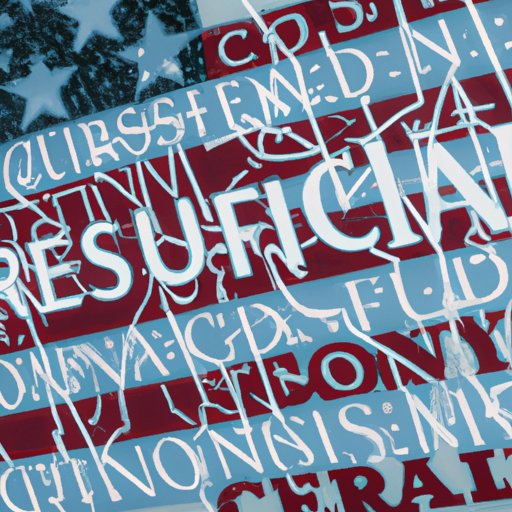Introduction
Cybersecurity is the practice of protecting networks, systems, and programs from digital attacks. These attacks are usually aimed at accessing, changing, or destroying sensitive information, extorting money from users, or interrupting normal business processes. In today’s increasingly digital world, it is essential that organizations have measures in place to protect their data and networks from cyber threats.
One of the most hotly debated topics in the field of cybersecurity is whether or not the federal government should be involved in managing it. On one hand, there are those who argue that the government has an obligation to protect its citizens from cyber threats. On the other hand, there are those who believe that the government should stay out of the realm of cybersecurity, as it could lead to additional costs and privacy risks.

Examining the Pros and Cons of Federal Management of Cybersecurity
In order to determine if the federal government should be involved in managing cybersecurity, it is important to consider both the advantages and disadvantages of such a decision.
Advantages of Federal Authority
The primary advantage of governmental involvement in cybersecurity is the increased security it would bring. The federal government has access to a wide range of resources, including technology, personnel, and funding, which can be used to implement effective security measures. Additionally, the government can create regulations that require organizations to comply with certain standards, such as encryption and authentication protocols.
Another benefit of federal involvement is that it would provide a unified approach to cybersecurity. Currently, each state has its own set of laws and regulations regarding cybersecurity, which can make it difficult for organizations to keep up with all of them. By having a single set of rules and regulations that are enforced by the federal government, organizations would be able to more easily comply with the law.
Disadvantages of Federal Authority
There are some drawbacks to federal involvement in cybersecurity as well. For example, the implementation of new regulations could be costly for organizations, as they may need to invest in new technologies or hire additional personnel. Additionally, there is the risk that the government could overstep its authority and infringe upon the privacy of individuals.
Finally, there is the potential for bureaucratic inefficiency. As with any government agency, there is always the risk that bureaucracy will slow down the process of implementing new regulations or responding to security breaches. This could lead to a lack of timely action, resulting in further damage to an organization’s systems.

Exploring the Potential Impact of Federal Authority Over Cybersecurity
The decision to involve the federal government in managing cybersecurity would have far-reaching impacts on multiple aspects of society. It is important to consider how this move would affect the economy, social structures, and politics.
Economic Effects
The economic impact of federal involvement in cybersecurity would depend largely on the type of regulations that are implemented. If the regulations are overly restrictive, they could limit innovation and discourage investment in the industry. On the other hand, if the regulations are reasonable and effective, they could encourage businesses to invest in cybersecurity technologies, leading to job growth and increased revenue.
Social Effects
The social implications of federal involvement in cybersecurity would depend on the types of regulations that are put in place. Regulations that are too restrictive could limit freedom of expression and impede the development of new technologies. On the other hand, regulations that are designed to protect privacy and ensure security could lead to a more secure online environment, encouraging people to use the internet more freely.
Political Effects
The political implications of federal involvement in cybersecurity are closely related to the economic and social impacts. If the regulations are effective, they could improve public trust in the government and encourage greater participation in the political process. However, if the regulations are seen as overly intrusive, they could lead to a loss of confidence in the government and a decrease in political engagement.
Investigating the Costs and Benefits of Governmental Intervention in Cybersecurity
When making the decision to involve the federal government in managing cybersecurity, it is important to consider both the short-term and long-term effects of such a move. Additionally, it is important to examine the potential costs and benefits of involving both the private sector and the public sector.
Short-term vs. Long-term Effects
In the short-term, the implementation of new regulations could be costly for organizations, as they may need to invest in new technologies or hire additional personnel. However, in the long-term, these investments could result in increased security, improved public trust, and greater economic stability.
Private Sector vs. Public Sector
The private sector is often better equipped to respond quickly to cyber threats than the public sector. Private companies are more agile, and can often develop new solutions faster than the government. However, the public sector has more resources, which can be used to implement larger-scale solutions that may be more effective in the long run.

Evaluating International Perspectives on Cybersecurity Governance
The issue of cybersecurity is not limited to the United States. Countries around the world have different approaches to managing cyber threats, and it is important to consider how these approaches differ from the U.S. perspective.
Different Countries’ Regulations
Many countries have adopted laws and regulations that require organizations to meet certain standards when it comes to cybersecurity. For example, the European Union’s General Data Protection Regulation (GDPR) requires organizations to take measures to protect the personal data of individuals. Similarly, Japan has enacted the Act on the Protection of Personal Information, which sets out requirements for the handling of personal data.
Comparisons to the U.S.
In comparison to other countries, the U.S. has relatively few regulations in place when it comes to cybersecurity. While there are some laws that address specific issues, such as the Health Insurance Portability and Accountability Act (HIPAA) and the Gramm-Leach-Bliley Act (GLBA), there is no overarching federal law that requires organizations to take specific measures to protect their data.
Analyzing the Challenges of Defining a Cybersecurity Framework
In order for the federal government to effectively manage cybersecurity, it must first develop a comprehensive framework for doing so. This framework must consider both the technological and legal/regulatory aspects of cybersecurity.
Technology Issues
From a technological standpoint, the framework must address issues such as the development of secure systems, the implementation of encryption protocols, and the monitoring of network activity. Additionally, the framework must consider how organizations can best use existing technologies to protect themselves from cyber threats.
Legal and Regulatory Issues
From a legal and regulatory perspective, the framework must address issues such as the enforcement of existing laws, the creation of new regulations, and the protection of individual rights. Additionally, the framework must consider how organizations can be held accountable for failing to meet the standards set forth by the government.

Assessing the Roles of Private and Public Sectors in Cybersecurity Management
In order for the federal government to effectively manage cybersecurity, it is important to consider the roles of both the private and public sectors. Each sector has its own strengths and weaknesses, and it is important to understand how they can work together to create a secure cyber environment.
Private Sector Responsibilities
The private sector is responsible for developing and deploying the technologies and services necessary to protect against cyber threats. Companies must also ensure that their systems are compliant with applicable laws and regulations.
Public Sector Responsibilities
The public sector is responsible for setting the standards for cybersecurity and enforcing the laws that govern it. The government must also ensure that the private sector is taking the necessary steps to protect against cyber threats.
An Overview of Current Cybersecurity Regulations and Their Effectiveness
Currently, there are several laws and regulations in place in the United States that address cybersecurity. These include the HIPAA and GLBA, as well as the Cybersecurity Enhancement Act of 2014 and the Cybersecurity Information Sharing Act of 2015.
Existing Laws
The HIPAA and GLBA are two of the most well-known laws related to cybersecurity. The HIPAA protects the privacy of individuals’ health information, while the GLBA protects financial information. The Cybersecurity Enhancement Act of 2014 and the Cybersecurity Information Sharing Act of 2015 are more recent laws that focus on improving the sharing of information between the government and the private sector.
Strengths and Weaknesses
These laws have been effective in increasing awareness of cybersecurity issues and encouraging organizations to take steps to protect their systems. However, they have not been successful in creating a comprehensive framework for managing cybersecurity. Additionally, they do not adequately address issues such as enforcement and accountability.
Conclusion
In conclusion, the decision to involve the federal government in managing cybersecurity is a complex one that must be carefully considered. There are both advantages and disadvantages to such a move, and it is important to weigh the potential impacts on the economy, social structures, and politics. Additionally, it is important to understand the roles of both the private and public sectors in cybersecurity management, and to evaluate the current regulations in place and their effectiveness.
Ultimately, it is clear that the federal government has an important role to play in managing cybersecurity. However, it is equally important to ensure that the regulations and frameworks created by the government are effective and do not infringe upon the rights of individuals.
(Note: Is this article not meeting your expectations? Do you have knowledge or insights to share? Unlock new opportunities and expand your reach by joining our authors team. Click Registration to join us and share your expertise with our readers.)
